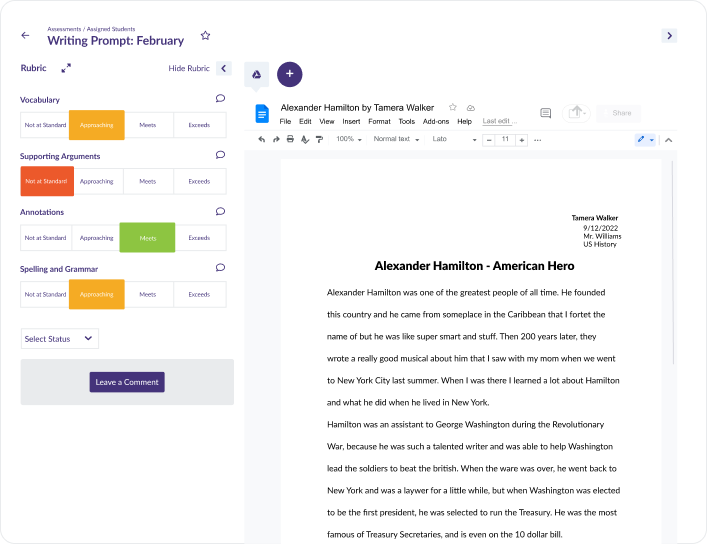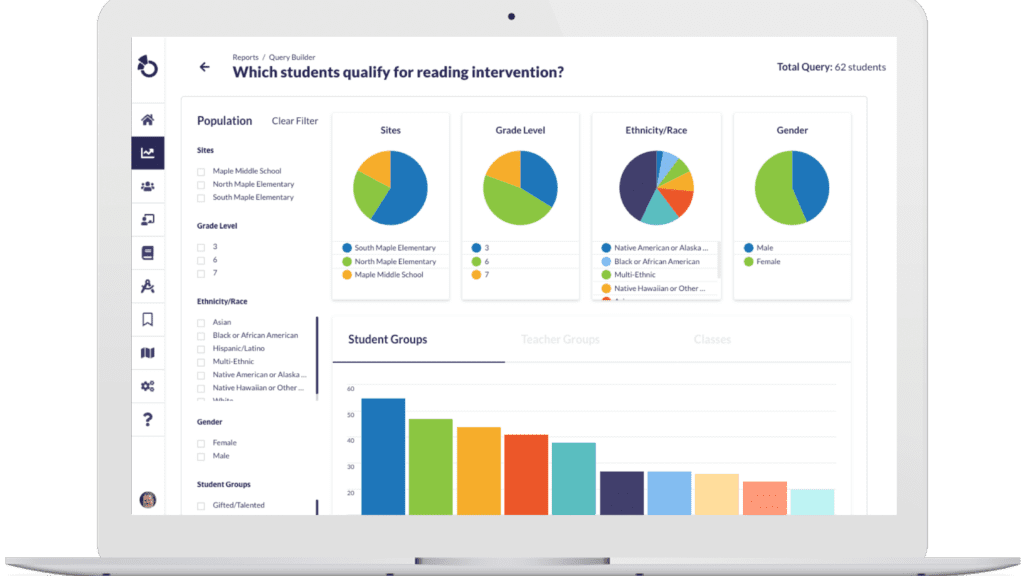How Educators Can Assess Student Non-Academic Skills
By: David Specht
Educators today recognize the critical importance of non-academic skills in shaping students' success. Skills like critical thinking, communication, and teamwork are not just complementary to academic learning but are essential for students' overall development and future readiness. It’s important for educators to understand the role of these skills in enhancing academic achievements, their impact on student growth, and the challenges and methods of assessing them. By focusing on these skills, educators can offer a more balanced and practical education, equipping students to excel both in and out of the classroom.
What Are Non-Academic Skills or Learning Standards, and Why Are They Important?
Non-academic skills, often referred to as soft skills or 21st-century skills, encompass a broad range of abilities that are crucial for success in life beyond the classroom. These include communication, teamwork, critical thinking, problem-solving, resilience, and adaptability. Unlike traditional academic skills, which are measured through standardized tests and grades, non-academic skills are more about how students approach learning and life challenges. They are essential because they equip students with the tools needed to navigate complex social environments, adapt to changing circumstances, and find success in their careers and lives.
How Do Non-Academic Skills Complement Academic Achievements in the Overall Education of a Student?
Non-academic skills complement academic achievements by enhancing a student's ability to apply knowledge in real-world scenarios. For instance, a student may excel in mathematics, but without skills like problem-solving or critical thinking, they might struggle to apply mathematical concepts in practical situations. These skills also foster a growth mindset, encouraging students to persevere through challenges, which is vital for lifelong learning.
Current Educational Focus on Non-Academic Skills
What Has Been the Traditional Emphasis in School Assessments, and How Is It Changing?
The current educational system predominantly focuses on academic achievements, with a heavy emphasis on standardized testing and curriculum-based assessments. However, there's an increasing awareness of the importance of non-academic skills, such as emotional intelligence, collaboration, and critical thinking. This shift is evident in initiatives like the integration of social-emotional learning (SEL) programs in schools, where students practice and are assessed on their ability to understand and manage emotions, set and achieve positive goals, feel and show empathy for others, establish and maintain positive relationships, and make responsible decisions. Such initiatives mark a significant step toward incorporating the assessment of non-academic skills into the educational process, reflecting a more holistic approach to student development.
Benefits of Assessing Non-Academic Skills
How Can Assessing Non-Academic Skills Contribute to a More Holistic Approach to Education?
Assessing non-academic skills allows educators to provide a more rounded education, ensuring students are not only knowledgeable but also equipped with the skills necessary to apply their knowledge effectively. For example, a project-based learning approach, where students work collaboratively to solve real-world problems, can help assess and develop skills like teamwork, creativity, and critical thinking. This method promotes a more balanced development, addressing the intellectual, social, and emotional aspects of a student's growth.
In What Ways Do Non-Academic Skills Prepare Students for Real-World Challenges?
Non-academic skills prepare students for real-world challenges by teaching them how to communicate effectively, work in teams, solve problems creatively, and adapt to new situations. A practical example is the implementation of role-playing or simulation exercises in the classroom. These activities can help students develop and refine their communication and problem-solving skills, which are crucial in various aspects of adult life, from personal relationships to professional environments.
Impact of Non-Academic Skill Assessment on Student Development
What Is the Impact of Non-Academic Skills on Student Personal Development and Well-being?
Non-academic skills significantly impact a student's personal development and well-being. For example, consider a school program focused on mindfulness and stress management techniques. Such a program can help students develop resilience and emotional intelligence, enabling them to manage stress and navigate personal and academic challenges more effectively. These skills are not only crucial for academic success but also contribute to a student's self-esteem and overall mental health. By learning to cope with stress and understand their emotions, students are better equipped to handle the pressures of school life and beyond, leading to a more balanced and healthy development.
How Do Non-Academic Skills Like Resilience, Teamwork, and Communication Play a Role in a Student's Life Beyond School?
In life beyond school, non-academic skills often differentiate successful individuals. Resilience can be seen in how a young professional navigates career setbacks or personal challenges, using these experiences as opportunities for growth. Teamwork is essential in most professional settings, where collaborative projects and team dynamics are the norm. Effective communication is crucial in almost every aspect of adult life, from resolving conflicts in personal relationships to presenting ideas in the workplace.
What Are the Long-Term Benefits for Students Who Develop Strong Non-Academic Skills?
Students with strong non-academic skills are generally better prepared for the complexities of adult life. Those who excel in emotional intelligence often have better career prospects and higher job satisfaction, as they can navigate workplace dynamics effectively. These skills can also contribute to healthier relationships and overall life satisfaction, as seen in individuals who maintain strong social networks and adapt well to life changes.
How Do Non-Academic Skills Impact Career Readiness and Employability?
Employers increasingly value non-academic skills, sometimes referred to as soft skills, often placing them on par with, or even above, technical abilities or academic qualifications. For example, a project manager's success often hinges not just on their technical know-how but on their ability to lead a team, resolve conflicts, and communicate effectively. Skills like teamwork, communication, and problem-solving are critical in most workplaces, making them essential for career readiness and employability.
Methods for Assessing Non-Academic Skills

Rubric assessments help students to become more aware of their learning process and progress, while also providing an opportunity for students to improve work. Rubrics in Otus can be used to clearly outline expectations for both academic and non-academic skills so students can clearly see where they fall in relation to the defined criteria and descriptors.
What Methods Can Schools Use to Assess Non-Academic Skills Fairly and Effectively?
Schools have a variety of methods at their disposal to effectively assess non-academic skills, each providing unique insights into a student's abilities. These methods include observational assessments, student self-assessments, project-based learning, and 360-degree feedback. A key tool in this mix is the use of rubrics, which offer a structured and clear framework for evaluating skills such as teamwork, communication, and problem-solving.
Rubrics enable educators to give students detailed feedback on specific aspects of their non-academic skills, helping them identify strengths and areas for improvement. This approach not only assists in developing a comprehensive learner profile but also makes the assessment process more transparent and understandable for students and families.
To ensure the objectivity and fairness of these assessments, it is crucial to employ a combination of culturally sensitive and unbiased methods. Rubrics can minimize subjectivity, offering clear criteria and standards for assessment. Training educators in the effective use of these rubrics is essential, as they need to be skilled in recognizing, measuring, and communicating non-academic skills in a way that is constructive and easy for students to understand. This comprehensive approach fosters a fair and transparent assessment process, creating an environment conducive to student learning and growth in all aspects of their development.
Building on the concept of rubrics, Otus Rubric Assessments provide a specialized and user-friendly solution. Otus allows educators to create custom rubrics with an intuitive builder, which can be saved for future use on other assessments. These rubrics can align with various standards, including all state standards, Common Core State Standards (CCSS) and the Next Generation Science Standards (NGSS), making them highly adaptable to different educational contexts. Otus Rubric Assessments are particularly effective for project-based learning and are integrated with Google Docs. This integration facilitates the seamless collection and distribution of student work, including images, videos, or documents, streamlining the assessment process and providing a dynamic way for educators to evaluate and understand students' non-academic skills.
Challenges of Assessing Non-Academic Skills
What Challenges Do Schools Face When Trying to Assess Non-Academic Skills?
A common challenge in assessing non-academic skills is the absence of a streamlined system. This issue becomes apparent when educators attempt to evaluate skills like empathy or leadership, which don't neatly fit into traditional grading scales. Furthermore, a significant gap often exists in communication with families regarding the language and methods used in these assessments. Families might struggle to understand how qualities like resilience or teamwork are measured and reflected in their child's educational progress. This disconnect can lead to confusion and a lack of engagement from families in supporting the development of these crucial skills.
Enhancing Family Understanding and Engagement in Non-Academic Assessment
The new Otus Family Gradebook helps to overcome the challenges that come with non-academic skill assessment by organizing data in a way that makes sense to families, providing a clear view of their child's overall performance. By displaying information on a single page, the Otus gradebook allows students and families to see a snapshot of performance across various dimensions – from formative and summative assessments to student work habits, all using separate grading scales. This approach aligns with best practices in education by separating non-academic factors from academic grading, thereby offering a more holistic view of student performance.
The redesign of the Otus gradebook is particularly beneficial in enhancing family communication, a critical aspect for K-12 school leaders. It equips families with a user-friendly tool, making it easier than ever to understand, track, and contribute to their child’s performance in all areas. This comprehensive visibility into the whole child is crucial for supporting student development both in and out of the classroom.
A Comprehensive Solution for Ensuring Development of Non-Academic Skills
The assessment of non-academic skills is a critical component of a comprehensive education system. It not only complements academic learning but also prepares students for the challenges of the real world, contributing significantly to their personal development, well-being, and future success. As education continues to evolve, it is imperative that schools find effective and fair ways to assess these essential skills. One tool that empowers educators to achieve this is Otus.
Otus is a versatile and user-friendly platform that bridges the gap between academic and non-academic skill assessment. It offers a suite of tools designed to facilitate the holistic evaluation of students. With Otus, educators can easily create and use rubrics tailored to various non-academic skills, ensuring that assessments are both comprehensive and specific to each skill set. This approach not only streamlines the assessment process but also provides clear, actionable feedback to students, helping them understand and improve their abilities in areas like teamwork, communication, and critical thinking.
Otus also recognizes the importance of involving families in the educational journey. Its family-friendly interface clarifies the assessment of non-academic skills, making it easier for families to understand and track their child's progress. This feature is crucial in fostering a supportive home environment that encourages the development of these skills.
In addition, Otus offers robust data analytics, allowing educators to monitor trends and make informed decisions about their teaching strategies. This data-driven approach ensures that the assessment of non-academic skills is not only a qualitative process but also one that can be quantitatively analyzed for continuous improvement.
For K-12 schools nationwide, Otus provides a comprehensive solution for the challenges faced in assessing non-academic skills. It allows for a significant step forward in preparing students for the complexities of the modern world, ensuring they are equipped with the necessary skills to succeed both academically and personally.
Related Resources
Request a demo!
See exactly how Otus can help your school accelerate student growth and improve student outcomes – all while saving educators time.





